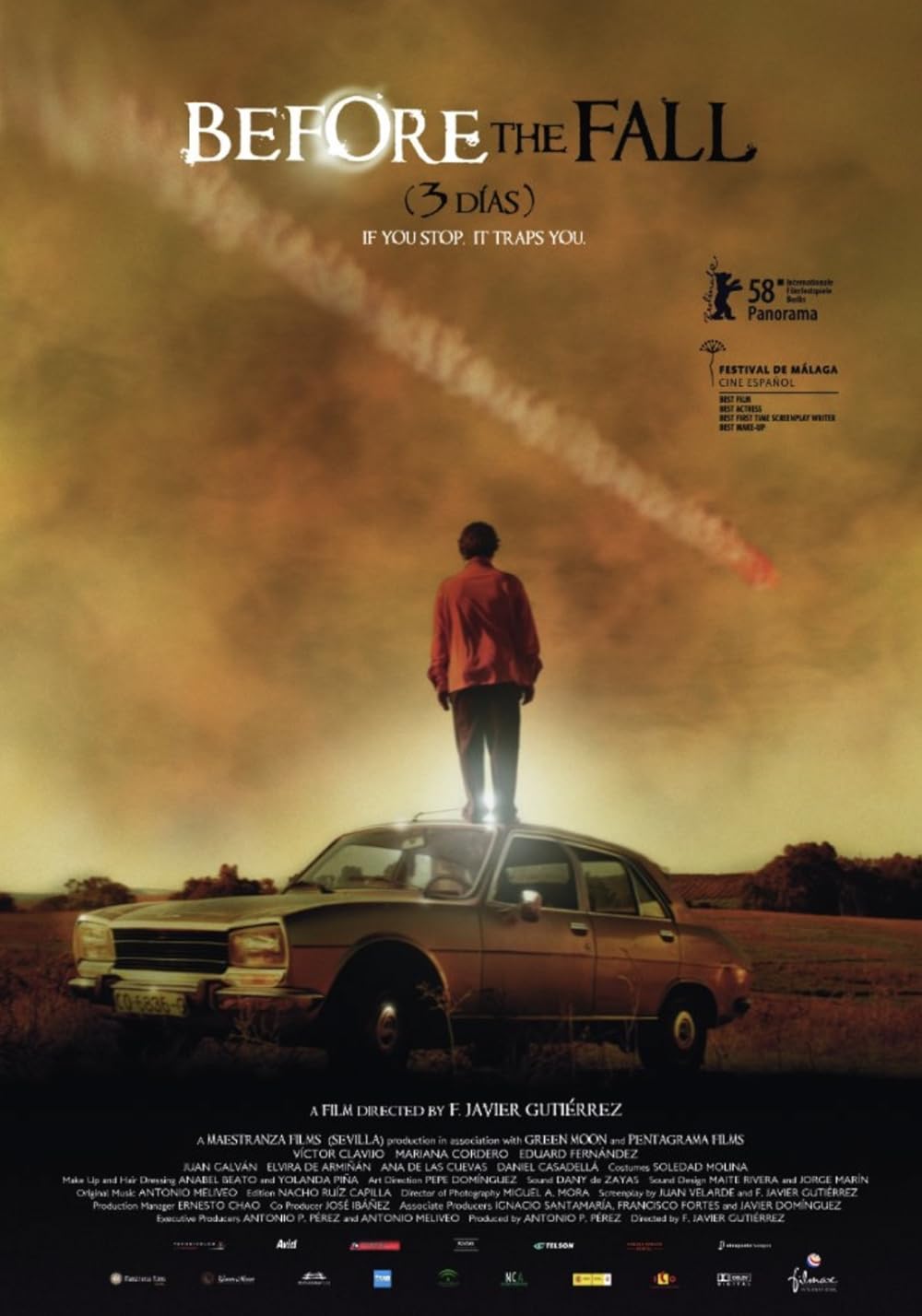“Tres días” (2008), also known internationally as “Before the Fall,” is a striking and thought-provoking Spanish film that combines elements of science fiction, drama, and thriller genres. Directed by F. Javier Gutiérrez, this film presents a unique and gripping narrative set against the backdrop of an impending apocalypse.

Film Title and Release Year:
The film, titled “Tres días” in Spanish, translates to “Three Days” in English. It was released in 2008 and is known in English-speaking markets as “Before the Fall.” The title encapsulates the film’s central premise – the story unfolds over three days leading up to a catastrophic event that threatens to end the world.
Director:
F. Javier Gutiérrez, the director of “Tres días,” is known for his ability to craft narratives that are both visually engaging and emotionally resonant. His directorial approach in this film is notable for its focus on character development and suspense, all set within a science fiction framework that feels both intimate and expansive.
Genre:
“Tres días” is primarily a science fiction thriller but also incorporates elements of drama. This blend allows the film to explore not just the speculative aspects of science fiction but also the human condition under extreme circumstances. The thriller component keeps the audience engaged with a sense of urgency and suspense, while the dramatic elements delve into the deeper emotional and moral complexities faced by the characters.

Production Context and Setting:
The production of “Tres días” is characterized by its attention to detail and its ability to create a believable world teetering on the brink of destruction. The setting is a small town in Spain, which adds a layer of realism and relatability to the apocalyptic scenario.
The film’s portrayal of a community’s response to an existential threat is both a narrative and technical achievement, balancing the vastness of the impending disaster with the intimacy of individual human experiences.
Plot Overview:
Expanding on the specific segment of the plot for “Tres días” (2008), also known as “Before the Fall,” the story intricately unfolds the psychological and societal impact of an impending apocalyptic event on a small, rural Spanish community, with a particular focus on the protagonist, Alejandro.
Beginning of the Apocalypse Announcement:
The tranquility of the rural town is shattered when the government makes a startling announcement – a massive meteorite is on a collision course with Earth, and impact is expected in just three days. This revelation sends shockwaves through the community, upending the lives of its residents, including Alejandro, a young man whose world is suddenly turned upside down.

Alejandro’s Initial Response:
Alejandro, who has lived an ordinary life in the town, is initially engulfed by disbelief and confusion. The film portrays his journey from denial to the acceptance of this grim reality.
His character serves as a conduit for the audience, reflecting the myriad of emotions – from fear to despair – that one might experience upon learning of such a catastrophic event.
Community’s Reaction:
The film delves into the reactions of the wider community, capturing the chaos and fear that ripple through the town. Some residents respond with denial, others with panic. We see scenes of hysteria, as well as moments of eerie calm, as people struggle to come to terms with the impending end of the world.
This societal breakdown is portrayed through various vignettes of the townspeople, providing a broader perspective on the human condition in the face of existential threats.
Moral Dilemmas and Challenges:
As the countdown to the meteorite’s impact progresses, Alejandro confronts not only his mortality but also deep moral dilemmas. The societal structures and norms begin to crumble, and Alejandro is faced with challenging situations that test his ethics and values.
The film explores how the prospect of impending doom can alter people’s behavior, leading to acts of both astonishing selflessness and harrowing selfishness.

Alejandro’s Relationships and Interactions:
Significant emphasis is placed on Alejandro’s interactions with his family, friends, and other townsfolk. These relationships are strained and tested as everyone grapples with their fears and impending doom. Alejandro finds himself in the role of a protector, a confidant, and at times, a moral compass for others, even as he wrestles with his own fears and uncertainties.
Climax and Personal Growth:
As the film moves towards its climax, Alejandro undergoes significant personal growth. Faced with the end of the world, he begins to reevaluate his life, his relationships, and what truly matters to him. This introspective journey is interwoven with the physical and social chaos surrounding him, creating a poignant contrast between internal and external conflicts.
Resolution:
In the final hours before the expected impact, the film reaches a resolution that is both emotionally charged and reflective. Alejandro, along with the other characters, comes to a point of acceptance and understanding. The resolution is handled with sensitivity, focusing not just on the fate of the world, but on the emotional and psychological journey of the individuals facing it.

Conclusion:
“Tres días” thus presents a profound exploration of human nature and societal dynamics in the face of an apocalyptic scenario. Through Alejandro’s story, the film captures the essence of human resilience, vulnerability, and the capacity for both despair and hope. It leaves the audience with a deep sense of introspection about life, mortality, and the human spirit’s ability to endure in the face of the unimaginable.
Characters and Dynamics:
Alejandro, the protagonist, is portrayed as an everyman forced to confront his deepest fears and insecurities in the face of impending doom. His relationships with family, friends, and fellow townspeople are central to the film’s exploration of human nature in extreme situations. The supporting characters each bring their perspectives to the narrative, enriching the film’s exploration of how different people react to the end of the world.
Thematic Exploration:
“Tres días” delves into themes such as survival, human nature, and the fragility of society. It poses questions about what people are capable of when faced with their mortality and the breakdown of societal norms. The film also explores themes of redemption, love, and family, providing a poignant look at what truly matters in the final moments.

Visual Style and Cinematography:
The film’s visual style is notable for its stark and evocative imagery. The cinematography effectively captures the tension and emotional turmoil of the characters, as well as the eerie calm before the impending disaster. The use of landscape and setting plays a significant role in the film, creating a sense of isolation and vulnerability.
Reception and Impact:
Upon its release, “Tres días” received acclaim for its original storytelling, strong performances, and effective blending of genres. It stood out as a unique contribution to the science fiction and thriller genres, particularly within Spanish cinema. The film has been appreciated for its ability to provoke thought and evoke emotion, making it a compelling watch for audiences seeking depth and intensity in their cinematic experiences.
In summary, “Tres días” (2008) is a film that masterfully combines the suspense of a thriller with the depth of a drama, all set against a science fiction backdrop. It’s a cinematic exploration of the human condition under the most extreme circumstances, marked by strong storytelling, memorable characters, and profound thematic exploration. The film is a testament to F. Javier Gutiérrez’s directorial prowess and a significant contribution to the genre.


 Telegram
Telegram
 Facebook
Facebook